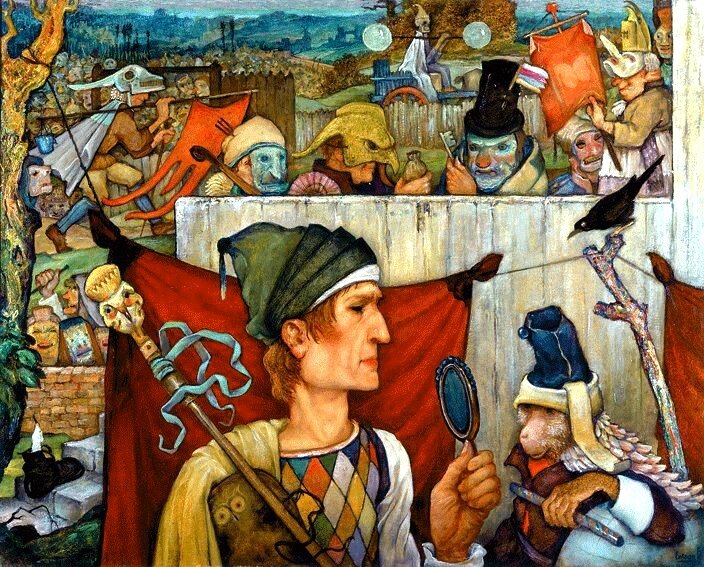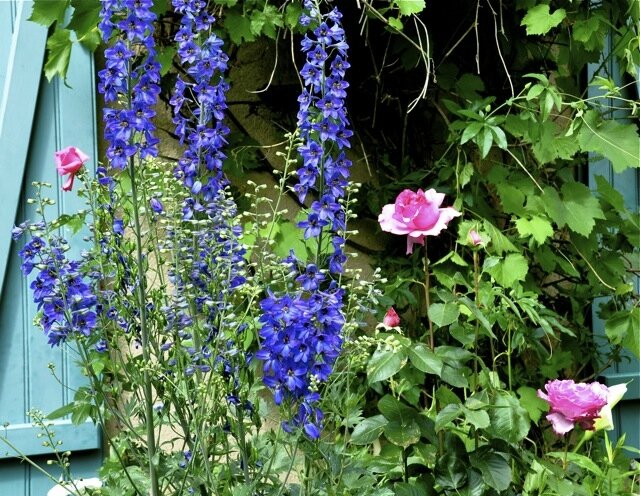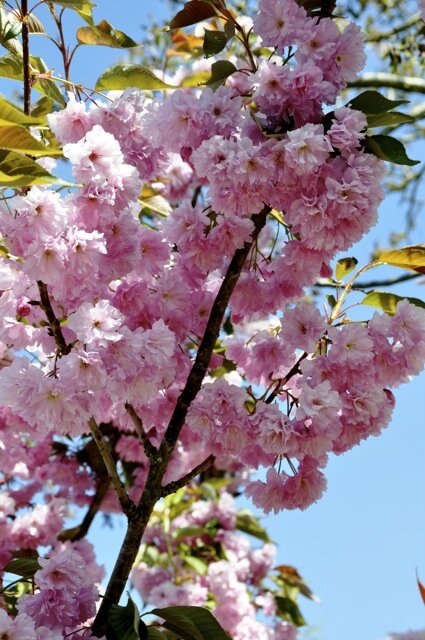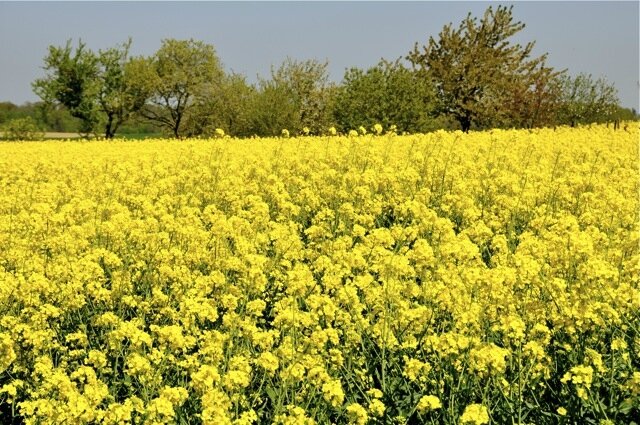Uropi koseten adjetive - Adjectifs composés - Compound adjectives
* Uropi Nove 104 * Uropi Nove 104 * Uropi Nove 104 *
★ ★ ★
Nicolas Eekman, Maskarad
★ ★ ★
Koseten adjetive in Uropi
******
Uropi av mole koseten vorde wim Doski, Greci, Rusi, Cini id mole alten lingas. Koseten vorde se ne u novi fenomen: dod forhistòr, po ne dezo dod li genad, lingas av uzen di prosesad po arico li vokabular. In Proto-Indeuropan, po samp, un find ʒa koseten vorde wim *kwetwor-pod- = kwerpod, gwou-kwolos = goviherdor, *somo-pḥatōr = sompatri, *d(o)lh1 (-i-)gʰo-h2iu- = longiʒivi, *dyḗusphₐtḗr = helipater, *h1nómn̩ dʰeh1- = nomo (nom-davo), *pl̩h1u-poik/ḱos = moliklori, *seno-mehatēr = formata (seni-mata), *dems-pot- = domimastor (we davì despòt), *dṃpedom = plor ("sta po struo"), id sim pro.
De cevi prodèl koseten vordis se te lu se truvizi. Oʒe is un av ne leren la, oʒe is un av nevos vizen la dafòr, un moz incepo la o bemìn gedo li sinad. Un moz incepo de sin u koseten vordi wan un kon de sin ji elementis. Po samp, is un viz po de pri vos de vord "phare" in Franci, un incèp ne ji sinad, un doʒ lero ja. Ba is un kogòn de Doski vord "Leuchtturm", un incèp anmidim te je s'u tor (Turm) ki u luc (Licht + leuchten = cijo), sim u lucitòr… Eke koseten vorde se mij-truvizi, wim po samp lighthouse in Engli: un av ʒe luc (light), ba u lucitòr se ne verim u "has" (house).
Un alten samp se de Franci vorde "cascade" id "cataracte" we vidì inlesten od Itali id Greci; be pri viz un moz ne incepo la: un doʒ lero la. De Germàni id Slavi vorde gonim se perfetim klar: waterfall, Wasserfall, vodopad… un av "vod" (water, Wasser, voda) id "falo" (fall, fallen, padat'). De Indonesi vord air terjun (vod + dupo) id de Hindi, Bengali vorde jal(a)prapāt (vod + fal) se os truvizi, wim Franci "chute d'eau".…
******
Azalea
******
Adjectifs composés en Uropi
******
L'Uropi possède de nombreux mots composés tout comme l'allemand, le grec, le russe, le chinois et beaucoup d'autres langues. Il ne s'agit pas d'un phénomène nouveau: depuis la préhistoire, pour ne pas dire depuis la naissance du langage, les langues ont utilisé ce procédé pour enrichir leur lexique. En proto-indo-européen, par exemple, on rencontre déjà des mots composés comme: *kwetwor-pod- = quadrupède, *gwou-kwolos= vacher, *somo-pḥatōr = qui a le même père, *d(o)lh1 (-i-)gʰo-h2iu- = qui a une longue vie, *dyḗusphₐtḗr = père du ciel, *h1nómn̩ dʰeh1- = nommer (nom-donner), *pl̩h1u-poik/ḱos = multicolore, *seno-mehatēr = grand-mère (vieille-mère), *dems-pot- = maître de maison (qui a donné despote), *dṃpedom = plancher ("endroit pour construire"), etc.
Le grand avantage des mots composés c'est qu'ils sont transparents. Même si on ne les a pas appris, même si on ne les a jamais vus auparavant, on peut les comprendre ou tout du moins deviner leur sens. On peut déduire la signification d'un mot composé lorsque l'on connait le sens de ses éléments. Par exemple, si l'on rencontre pour la première fois le mot français "phare", on n'en comprend pas le sens, il faut l'apprendre. Mais si on voit le mot allemand "Leuchtturm", on saisit tout de suite qu'il s'agit d'une tour (Turm) avec une lumière (Licht + leuchten = briller), donc un phare… certains mots composés sont à demi-transparents, comme l'anglais lighthouse, par exemple: on a bien lumière (light), mais un phare n'est pas vraiment une "maison" (house).
Prenons d'autres exemples comme les mots français "cascade" et "cataracte" qui ont été empruntés à l'italien et au grec; on ne peut les comprendre d'emblée: il nous faut les apprendre. Les termes germaniques et slaves en revanche sont parfaitement clairs: waterfall, Wasserfall, vodopad… nous avons "eau" (water, Wasser, voda) et "tomber" (fall, fallen, padat'). Les termes indonésien: air terjun (eau + plonger), hindi et bengalais: jal(a)prapāt (eau + tomber) sont également transparents, comme le français "chute d'eau", d'ailleurs.
******
******
Compound adjectives in Uropi
******
There are a lot of compounds in Uropi just as in German, Greek, Russian, Chinois and many other languages. This is not a new phenomenon: since prehistoric times, not to say since the very birth of language, languages have resorted to this process to expand their vocabulary. In Proto-Indo-European, for instance, you can already find compounds like: *kwetwor-pod- = quadruped, *gWou-kWolos= cowherd, *somo-pḥatōr = who has the same father, *d(o)lh1 (-i-)gʰo-h2iu- = long-lived, *dyḗusphₐtḗr = sky-father, *h1nómn̩ dʰeh1- = to name (name-give), *pl̩h1u-poik/ḱos = multicolored, *seno-mehatēr = grandmother (old-mother), *dems-pot- = master of a house (which gave despot), *dṃpedom = floor ("place to build on"), etc.
The main avantage of compounds is that they are transparent. Even if you haven't learned them, even if you have never seen them before, you can understand them or at least guess their meaning. You can infer the significance of a compound from the sense of its elements. For example, when you hear the French word "phare" for the first time, you can't understand what it means, you have to learn it. But if you see the German word "Leuchtturm", you can grasp immediately that it deals with a tower (Turm) with a light (Licht + leuchten = to shine), thus a lighthouse… some compounds are half-transparent, like English lighthouse, for instance: if we have light all right, a lighthouse is not really a "house".
Let us take other examples like the French words "cascade" and "cataracte" which were borrowed from Italian and Greek; they cannot be understood at first glance, you can't guess their meaning: you have to learn them. The Germanic and Slavic terms on the other hand are perfectly clear: waterfall, Wasserfall, vodopad… we have water (Wasser, voda) and fall (fallen, padat'). The Indonesian: air terjun (water + plunge), Hindi and Bengali words: jal(a)prapāt (water + fall) are also transparent, and so is French "chute d'eau" as well.
******
******
Sampe koseten vordis id li Uropi eglivalte in…
Exemples de mots composés et de leur équivalent Uropi en…
Examples of compounds with their Uropi equivalents in…
Greci - grec - Greek
ηλιοθεραπεία "iliotherapia" = Ur solibàn = bain de soleil, sunbathing, ηλιόφωτο "iliofôto" = soliluc = lumière du soleil, sunlight, ηλιοστάσιο "iliostasio" = solistàd = solstice, ηλιοψημένος "iliopsimenos" = "solirosten", solibran = bronzé (grillé au soleil), sun-tanned, υδατόπυργος "ydatopyrgos" = voditòr = château (tour) d'eau, water tower, υδρόβιος "ydrovios" = vodiʒivi = aquatique (qui vit dans l'eau), aquatic, νερόμυλος, υδρόμυλος "neromylos, ydromylos" = vodimulia = moulin à eau, watermill, υδατογραφία "ydatografia" = vodiklòr = aquarelle, watercolor, φωταέριο "fôtaério" = lucigaz = gaz de ville, town gas, φωτοσκίαση "fôtoskiasi" = lucidùm = clair-obscur, chiaroscuro, πυροτέχνημα "pyrotekhnima" = artifoj = feu d'artifice, fireworks, πυροφοβία "pyrofovia" = fojifraj, pyrophobie (peur du feu), pyrophobia (fire scare), i.s.p., etc.
Rusi - russe - Russian
водобоязнь "vodoboiazn'" = vodifraj = hydrophobie (peur de l'eau), hydrophobia (fear of water), водоворот "vodovorot" = vodivirb = tourbillon (dans l'eau), whirlpool, Водолей "vodoleï" = Vodilìj = Verseau, Aquarius, водомер "vodomer" = vodimez = jauge d'eau, water gauge, водопад "vodopad" = vodifàl = cascade, waterfall, водоросль "vodorosl'" = vodiplant = plante aquatique, water plant, солнцестояние "solntsestoyanie" = solistàd = solstice, светочувствительный "svietachuv-stvitel'nyï" = lucisensivi = photosensible, photosensitive, светотень "svietotien'" = lucidùm = clair-obscur, chiaroscuro, огнемёт "ognemiot" = flamibasèl = lance-flammes (feu), flamethrower (fire-), огнепоклонник "ogniepoklonnik" = fojadoror = adorateur du feu, fire-worshipper, i.s.p., etc.
Cini - chinois - Chinese
Ur. teriskut (tremblement (secousse) de terre, earthquake) = 地震 dìzhèn: dì = terre, earth et zhèn = secouer, shake, korbibàl (basket "balle au panier", basket-ball) = 篮球 lánqiú: lán = panier, basket et qiú = balle, ball, kablivag (téléphérique "voiture-cable", cable-car) = 缆车 lǎnchē: lǎn = cable et chē = voiture, car, korvivag: (corbillard, voiture transportant un cadavre, hearse, car carrying a corpse), 灵车 língchē: voiture qui transporte une âme ou un esprit, car carrying a soul or a spirit.
Chinois, Chinese: dòu = lutte, fight + niú = bovin, cow, ox > 斗牛 dòuniú = corrida, bullfighting (cf Ur. taurikamb), jīn = or, gold + yú = poisson, fish > 金鱼 jīnyú = poisson rouge, goldfish (poisson d'or = Ur. goripìc), jiàn = voir, see + zài = à nouveau, again > 再见 zàijiàn = au revoir, good bye, see you again (Ur. a revizo), bèi = dos, back + bāo= sac, sack > bèibāo = sac à dos, rucksack, backpack (Ur. rukisak), dàn = oeuf, egg + bái = blanc, white > dànbái = blanc d'oeuf, egg white (Ur. ovibìj), ěr = oreille, ear + huán = anneau, ring > ěrhuán = boucle d'oreille, earring (Ur. orirìng), lún = roue, wheel + yĭ = chaise, chair > lúnyĭ = fauteuil roulant, wheelchair (Ur. rolisèl), i.s.p., etc.
******
Lilak
******
De majsan koseten vorde in Uropi se andubim nome wim soliflòr, vintimulia, solifàl, teriskut, korbibàl, goripìc, vagiluc,… id sim pro, ba je ste os koseten verbe wim, po samp: kopivendo, prizivoko, spritireno…
Di artikel ve delo uskluzim ki koseten adjetive: lu se mol rari in Franci, ba lu se komùn in Engli (po samp: queenlike, star-shaped, bloodthirsty, profit-seeking, narrow-minded, seasick, meaningful…) id mol numari in Doski (po samp: leitfähig, kampffähig, blutgierig, gewinnsüchtig, hochmutig, wankelmutig, gesetzmäßig, übermäßig, großartig, eigenartig, herzkrank, zuckerkrank, sinnvoll, hilfsbereit…). Un find la os in Greci id in Slavi lingas wim Rusi.
******
La plupart des mots composés en Uropi sont indubitablement des noms comme soliflòr, vintimulia, solifàl, teriskut, korbibàl, goripìc, vagiluc, (tournesol, moulin à vent, coucher de soleil, tremblement de terre, basket-ball, poisson rouge, phare de voiture)… etc., mais il existe aussi des verbes composés, comme par exemple: kopivendo, prizivoko, spritireno… = acheter & vendre, marchander (discuter les prix), gambader (sauter-courir)…
Cet article traite exclusivement des adjectifs composés: ils sont très rares en français, mais ils sont fréquents en anglais (par exemple: queenlike, star-shaped, bloodthirsty, profit-seeking, narrow-minded, seasick, meaningful…) et beaucoup plus nombreux encore en allemand (par exemple: leitfähig, kampffähig, blutgierig, gewinnsüchtig, hochmutig, wankelmutig, gesetzmäßig, übermäßig, großartig, eigenartig, herzkrank, zuckerkrank, sinnvoll, hilfsbereit…). On en trouve également en grec moderne et dans les langues slaves comme le russe.
******
Most Uropi compounds are undoubtedly nouns like soliflòr, vintimulia, solifàl, teriskut, korbibàl, goripìc, vagiluc, (sunflower, windmill, earthquake, basket-ball, goldfish, headlight)… etc., but there are also compound verbs, like for instance: kopivendo, prizivoko, spritireno… = buy & sell, to bargain (discuss the price), frolic, gambol (jump-run)…
This article deals exclusively with compound adjectives: they are very rare in French, but frequent in English (for example: queenlike, star-shaped, bloodthirsty, profit-seeking, narrow-minded, seasick, meaningful…) and far more numerous still in German (for ex: leitfähig, kampffähig, blutgierig, gewinnsüchtig, hochmutig, wankelmutig, gesetzmäßig, übermäßig, großartig, eigenartig, herzkrank, zuckerkrank, sinnvoll, hilfsbereit…). They can also be found in modern Greek and in Slavic languages like Russian.
******
******
Sampe koseten adjetivis - Exemples d'adjectifs composés -
Examples of compound adjectives
******
Geniveri, lit"vrai de naissance" = authentique, Eng genuine "true from birth"
Eglijusti, "égal & juste" = équitable, Eng. equitable, fair and impartial
Kutisovi = doux comme la peau, Eng soft like skin
Sovikuti = qui la peau douce, Eng soft-skinned
Sabigusti = savonneux, qui a un goût de savon, Eng tasting like soap
Veridiki = qui montre que c'est vrai, véridique, Eng truthful, veracious "showing it is true"
Brijklori = aux couleurs vives, Eng bright-coloured
Miasijedi = qui mange de la viande, carnivore, Eng carnivorous "meat-eating"
Flizispeli = rapide comme l'éclair, d'une vitesse foudroyante, Eng like lightning, D blitzschnell
Malvoli = malveillant, qui veut du mal, Eng malevolent, D bösartig
Magibèl = magnifique (d'une très grande beauté), Eng magnificent, Rus великолепный
Bundavi = généreux (qui donne bien), Eng generous, D gebefreudig
Bunnaturi = qui a un bon naturel, Eng good-natured, D gutmütig
Bunlumi = de bonne humeur, Eng good-humored, D gut gelaunt
Kristaliklàr = clair comme de l'eau de roche (du cristal), Eng crystal-clear, D kristallklar
Vodiklàr = clair comme de l'eau (de roche), Eng as clear as daylight, D wasserklar
Vodiʒivi = aquatique (qui vit dans l'eau), Eng aquatic, Gr υδρόβιος
******
Adjetive in -abli (= qui peut, capable de, en état de), Eng able to, D. -fähig
erdabli = qui peut hériter, Eng heritable, D. erbfähig
vadabli = qui peut marcher, Eng ambulant, able to walk, D. gehfähig
navabli = en état de naviguer, Eng seaworthy, D. seefähig
bankabli = bancable, Eng bankable, D. bankfähig
flevabli = en état de voler, Eng airworthy, D. flugfähig
dutabli = conducteur (électricité…), Eng conductive, D. leitfähig
******
******
lerabli = capable d'apprendre, Eng able to learn, D. lernfähig
ʒivabli = viable, Eng viable, D. lebensfähig
armidabli = bon pour l'armée, Eng fit for the army, D. wehrfähig
genizabli = fécond, capable de procréer, Eng able to procreate, D. gebärfähig
kambabli = en état de combattre, Eng able to fight, fit for action, D. kampffähig
ʒudabli = capable de juger, Eng able to judge, D. urteilsfähig
funsionabli = en état de marche, Eng in working condition, D. betriebsfähig
servizabli = bon pour le service, Eng fit for service, D. dienstfähig
******
Adjetive in -deti (= qui fait, qui rend), cf fr. -ficiel, -fique, gr -poios, Eng -making, -ficial
Legideti = qui fait les lois, législatif, Eng. legislative, lawmaking
artideti = artificiel, Eng artificial, artful
bundeti = qui fait du bien, bénéfique, Eng doing good, beneficial, D. wohltuend
maldeti = qui fait du mal, maléfique, maligne, Eng doing evil, maleficent, malignant
krimideti = qui commet des crimes, criminel, Eng committing crimes, criminal
vomideti = émétique, vomitif, qui fait vomir, Eng emetic, vomitive
******
Adjetive in -formi (= qui a la forme de), cf fr. -forme, -morphe, Eng -form, -morphic "-shaped", D. -förmig
krosiformi = cruciforme, Eng cruciform "cross-shaped"
steliformi = en forme d'étoile, Eng star-shaped, D sternförmig
variformi = qui a plusieurs formes, Eng variform
moliformi = multiforme, polymorphe, Eng multiform (with many shapes)
somiformi = qui a la même forme, homomorphe, Eng homomorphic (of the same form)
uniformi = uniforme, Eng uniform
libiformi = qui ressemble à une lèvre, labié, Eng liplike
foliformi = en forme de feuille, Eng. leaflike
******
Repsipold in verna
******
niliformi = filiforme, Eng threadlike, D fadenförmig
oviformi = ovoïde, en forme d'oeuf, Eng egg-shaped, D eiförmig
luniformi = en forme de lune, de croissant, Eng moon-shaped, D mondförmig
siangiformi = anguiforme, qui a la forme d'un serpent, Eng snake-shaped
digiformi = en forme de doigt, digitiforme, Eng finger-shaped
cumpiformi = en forme de champignon, fongiforme, Eng mushroomlike, D pilzartig
flamiformi = en forme de flamme, Eng flamelike, D flammenartig
kaferniformi = en forme de fer à cheval, Eng horseshoe-shaped, D hufeisenförmig
lingiformi = en forme de langue, linguiforme, Eng tongue-shaped
piriformi = en forme de poire, piriforme, Eng pear-shaped, D birnenförmig
piciformi = en forme de poisson, pisciforme, Eng fish-shaped
toriformi = en forme de tour, Eng towerlike
vermiformi = en forme de ver, vermiforme, Eng vermiform (worm-shaped)
******
Adjetive in -guri, -sisti = avide de, qui a soif de, Eng. greedy of…, -thirsty, D -gierig, -süchtig
aviguri = avide, rapace, Eng acquisitive, rapacious, D habgierig
glodisisti = assoiffé de sang, Eng bloodthirsty, D blutgierig
vrengisisti = vindicatif, assoiffé de vengeance, Eng revengeful, vindictive, D rachsüchtig
gloriguri = avide de gloire, Eng thirsting for glory, D ruhmsüchtig, ruhmbegierig
mogadiguri = avide de pouvoir, Eng power hungry, D machtsüchtig
luksiguri = avide de luxe, Eng greedy for luxury, D prunksüchtig
ganiguri = cupide, avide de gains, Eng profit-seeking, D gewinnsüchtig
jediguri = goinfre, glouton, Eng piggish, gluttonous, D fressgierig
seksiguri = obsédé par le sexe, Eng sex-mad, D sexbesessen
valdiguri = despotique, avide de dominer, Eng domineering, high handed, D herrschsüchtig
******
******
blatiguri = cancanier, avide de commérages, Eng gossipy, garrulous, D klatschsüchtig
grandiguri = mégalomaniaque, qui a la folie des grandeurs, Eng megalomaniac, D großmannsüchtig
wastiguri = qui ne pense qu'à gaspiller, Eng extravagant, profligate, D verschwendungssüchtig
grabiguri = avide, rapace, Eng grabby, D raffgierig
posediguri = possessif, Eng possessive, D besitzgierig
leriguri = avide d'apprendre, studieux, Eng studious, assiduous, D lernbegierig
******
Adjetive in -menti, -almi o -feli = qui a l'esprit, l'âme…, qui sent, Eng. -minded, D -mutig
slimimenti = simple d'esprit, Eng simple-minded
metimenti = versatile, inconstant (à l'esprit changeant), Eng fickle, unsteady, D wankelmütig
varimenti = versatile, inconstant (à l'esprit variable), Eng fickle, variable, D wankelmütig
eglifeli = indifférent, Eng indifferent, D gleichgültig
eglimenti, eglilumi = impassible, posé, serein (d'humeur égale), Eng composed, serene, D gleichmütig
stritimenti = étroit d'esprit, Eng narrow-minded, D engstirnig
mikimenti = pusillanime, timoré, Eng fainthearted, D kleinmütig, Gr μικρόψυχος, Rus малодушный
sovimenti = accommodant, conciliant, débonnaire, Eng compliant, good-natured, D sanftmütig
magalmi = magnanime, Eng magnanimous, gr μεγαλόψυχος, Rus великодушный
holmenti = hautain, altier, arrogant, Eng haughty, arrogant, D hochmütig
******
Adjetive in -mezi = conforme à (< mez = mesure), Eng. complying with, in accordance with, D -mäßig
midimezi = modéré (qui tend vers le milieu), Eng moderate, D. (mittel)mäßig
eglimezi = bien proportionné, Eng shapely, well-proportioned, D. ebenmäßig
legimezi = légitime, Eng legitimate, D. gesetzmäßig
planimezi = conforme aux prévisions, au plan, Eng as planned, D. planmäßig
tempimezi = en mesure, en rythme, Eng in rhythm, rhythmically, D. im Takt, taktmäßig
uvemezi = excessif, qui passe la mesure, Eng excessive, D. übermäßig
******
Azalea
******
virtimezi = à tour de rôle, par roulement, Eng in rotation
forsimezi = par la force, Eng forcible, D. zwangsmäßig
nudimezi = conforme aux besoins, Eng according to the needs, D. bedarfsmäßig
volimezi = volitif, Eng volitional, D. willensmäßig
reglimezi = réglementaire, Eng complying with the regulations, D. ordnungsgemäß
******
Adjetive in -modi = à la manière de, Eng. -like, D -artig
siavimodi = singulier, particulier (qui a ses propres façons), Eng peculiar, singular, D eigenartig
Grecimodi = à la grecque, Eng Greek-like
andimodi = à la manière d'un canard, Eng ducklike, D entenartig
grandimodi = grandiose, magnifique, pompeux, Eng magnificent, grandiose, D großartig
novimodi = nouveau, original, innovant, d'avant-garde, Eng novel, original, D neuartig
ruskimodi = saccadé, cahoteux, Eng jerky, bumpy, jolting, D ruckartig
******
Adjetive in -pati = malade, -pathe, Eng. -sick, -pathic, D -krank
maripati = qui a le mal de mer, Eng seasick, D seekrank
erdipati = qui une maladie héréditaire, Eng with a hereditary disease, D erbkrank
moripati = en phase terminale, Eng terminally ill, D todkrank
vagipati = malade en voiture, Eng carsick, D autokrank
karʒipati = cardiaque, malade du coeur, Eng with a heart disease, D herzkrank
avipati = malade en avion, Eng airsick, D luftkrank
ojipati = malade des yeux, Eng with an eye disease, D augenkrank
kankripati = malade du cancer, Eng ill with cancer, D krebskrank
febripati = malade d'une fièvre, Eng ill with fever, D fieberkrank
liamipati = malade d'amour, Eng lovesick, D liebeskrank


/https%3A%2F%2Fprofilepics.canalblog.com%2Fprofilepics%2F2%2F7%2F277026.jpg)












/http%3A%2F%2Fstorage.canalblog.com%2F60%2F50%2F321345%2F131836320_o.jpg)
/http%3A%2F%2Fstorage.canalblog.com%2F07%2F27%2F321345%2F126713582_o.jpg)
/http%3A%2F%2Fstorage.canalblog.com%2F99%2F93%2F321345%2F124897632_o.jpg)
/http%3A%2F%2Fstorage.canalblog.com%2F87%2F24%2F321345%2F120422766_o.jpg)